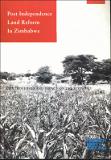| dc.contributor.author | Masiiwa, Medicine | |
| dc.contributor.author | Chipungu, Lovemore | |
| dc.coverage.spatial | Zimbabwe. | en |
| dc.date.accessioned | 2016-03-21T13:02:33Z | |
| dc.date.available | 2016-03-21T13:02:33Z | |
| dc.date.issued | 2004 | |
| dc.identifier.citation | Masiiwa, M. and Chipungu, L. (2004) Land reform programme in Zimbabwe: disparity between policy design and implementation. In: Masiiwa, M. (ed.) Post-independence land reform in Zimbabwe: controversies and impact on the economy. Harare: Friedrich Ebert Stiftung and Institute of Development Studies, University of Zimbabwe, pp. 1-25. | en |
| dc.identifier.isbn | 0797427864 | |
| dc.identifier.uri | https://opendocs.ids.ac.uk/opendocs/handle/20.500.12413/10187 | |
| dc.description | A research paper highlighting the disparities between land reform programme policies and their implimantation in Zimbabwe. | en |
| dc.description.abstract | Land is a natural resource that has always been hotly contested among groups of people living between the Zambezi and the Limpopo. Before the arrival of the first European settlers over a century ago, bloody tribal and ethnic battles were fought for land. The Europeans found two major tribes, Shona and Ndebele living in the now Zimbabwe. The livelihood of the former tribe was based on agricultural and pastoral activities while that of the latter was largely based on highly organised military structures. In both cases, the nucleus of the government was composed of the Chief, supported by councillors and headmen
The colonial conquest of the country by the British in the late 1880s destroyed these systems and subordinated the African people in both political and economic terms. Economic subordination started by the passing of the Land Apportionment Act in 1930, which formalised racial separation of land. Africans lost their coveted land and substantial economic power as they were driven to marginal areas with inherently poor soils and erratic rainfall. Although farming was part of their livelihoods and the sole source of food and income, a series of repressive legislation prohibited them from participating on the mainstream of the economy. This, apparently led the disgruntled majority blacks to take arms and fight a protracted war against the injustices. In 1980, they won political independence and the new ZANU PF government promised the empowerment of the people by giving them land. A policy tool identified for this purpose was the land redistribution and resettlement programme. | en |
| dc.description.sponsorship | Friedrich Ebert Stiftung Foundation. | en |
| dc.language.iso | en | en |
| dc.publisher | Friedrich Ebert Stiftung and Institute of Development Studies, University of Zimbabwe, Harare, | en |
| dc.rights.uri | http://creativecommons.org/licenses/by-nc-nd/3.0/ | en |
| dc.subject | Development Policy | en |
| dc.subject | Economic Development | en |
| dc.title | Land reform programme in Zimbabwe: disparity between policy design and implementation | en |
| dc.type | Book chapter | en |
| dc.rights.holder | © This collection: Medicine Masiiwa, Friedrich Ebert Stiftung and Institute of Development Studies, University of Zimbabwe | en |


